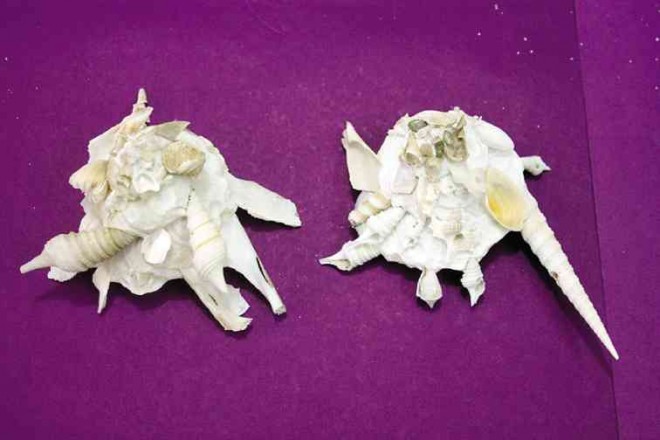The Carrier Shell got its name from its uncanny ability to collect and then attach the empty and discarded shells of other mollusks, pieces of coral or sponge and even pebbles and stones onto its own shell.
Both its common name and its Latin name, Xenophoridae (“foreign-carrying”), speak well of this remarkable ability and unique habit.
It will cement onto its shell whatever debris it finds lying on the surface of the seabed, which it then carries like a prized trophy everywhere it goes. This resourceful mollusk glues these doodads onto itself for defense and protection.
A formidable armor of spines and spikes increases its size and renders it difficult if not impossible for predators to swallow. The “bling-blings” it carries on its back provide perfect camouflage as well, so that the animal can live safe and secure between its shell and the ocean floor.
Hermit crabs meticulously select and salvage empty and discarded shells of sea snails for protection from its predators. These crustaceans, unlike their more popular relatives such as crabs and lobsters, do not possess shells of their own. Their long, spirally-curved abdomens are soft and vulnerable and the salvaged empty seashells into which they hide and retract provide perfect camouflage and protection.
Scavengers are organisms that feed on dead animal or plant materials, which are present and available in their particular habitats. They play an important role in the ecosystem by consuming the remains of animals or plants that have died.
Well-known scavengers of dead animal materials include buzzards, vultures and crows, rodents and raccoons, burying beetles and yellow-jacket wasps.
Large carnivores such as lions, wolves and hyenas, which are not usually considered scavengers, are not above eating the carcasses of dead animals in dire circumstances like drought, famine or the dearth of live prey to catch.
Feral dogs and pigs exploit the occasional roadkill. Piranhas, despite their notoriety as apex predators, are actually scavengers, fulfilling in the water the role played by vultures on land.
Scavengers of dead plant materials include termites, ants and dung beetles.
Decomposers are organisms that break down dead or decaying plant or animal materials. In the process of doing so, they aid and complete the natural process of decomposition.
The most important decomposers are bacteria and fungi that break down just about any type of organic matter. They are vital in the recycling of nutrients in most ecosystems.
Carrier shells, hermit crabs and the many different kinds of scavengers and decomposers in the natural world are the very first adherents, proponents and practitioners of the three Rs of environmental waste reduction and management control. They are the original recyclers, reusers and reducers, wanting what others do not want anymore, wasting not and wanting not.
Today, we live in a throwaway society where people find it so easy to dispose of personal items such as electronic gadgets, appliances, furniture or cars that may or may not have some kind of damage or defect, that may have been rendered obsolete by new and better products in the market, or that the owner may have simply grown tired of using.
Even human lives have not been spared and we are now seeing more and more instances of friends or spouses, deemed to be no longer useful or desirable, being carted off to the landfill of eternal oblivion, unfriended and unloved.
People with a throwaway mentality are wasteful, very materialistic. They never know a moment of peace and contentment.
Take a leaf out of the humble carrier shell, who must know that willful waste makes woeful want. Wise use of resources that are made available to us will keep us from want and poverty.
It is a given that if you do not waste anything, you will always have enough. We must make do with what we have and be content and grateful for what God and Nature have given us. Waste not, want not—that is the lesson of the carrier shell.
The author is the academic supervisor at Marian School of Quezon City and curator of the school’s Museum of Rocks and Shells. E-mail him at sickbooks_togo@yahoo.com.
